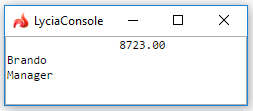example code #1
MAIN
DEFINE json_obj util.JSONObject
LET json_obj = util.JSONObject.create()
CALL json_obj.put("id", 8723)
CALL json_obj.put("name", "Brando")
CALL json_obj.put("position", NULL)
DISPLAY json_obj.has("name")
CALL fgl_getkey()
END MAIN
obtained results #1

example code #2
MAIN
DEFINE json_obj util.JSONObject
LET json_obj = util.JSONObject.create()
CALL json_obj.put("id", 8723)
CALL json_obj.put("name", "Brando")
CALL json_obj.put("position", "Manager")
IF json_obj.has("id") = TRUE THEN
DISPLAY json_obj.get("id")
ELSE
DISPLAY "No ID property"
END IF
IF json_obj.has("name") = TRUE THEN
DISPLAY json_obj.get("name")
ELSE
DISPLAY "No NAME property"
END IF
IF json_obj.has("position") = TRUE THEN
DISPLAY json_obj.get("position")
ELSE
DISPLAY "No POSITION property"
END IF
CALL fgl_getkey()
END MAIN
obtained results #2
